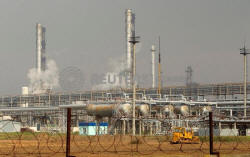Tainted oil hits Russian revenues but rouble immune for
now
 Send a link to a friend
Send a link to a friend
 [May 20, 2019]
By Elena Fabrichnaya, Andrey Ostroukh and Gleb Gorodyankin [May 20, 2019]
By Elena Fabrichnaya, Andrey Ostroukh and Gleb Gorodyankin
MOSCOW (Reuters) - Russia suffered a $1
billion shortfall in export revenues in the first two weeks of May after
the discovery of contaminated oil disrupted pipeline flows to Europe, a
Reuters calculation showed.
The final cost of the contamination may be several times higher,
economists said, but it seems unlikely at this stage to dent the
country's already fragile growth prospects or rock the rouble.
Crude export flows have been disrupted since April, when high levels of
organic chloride were found in oil pumped via Russia's Druzhba pipeline,
which serves Germany and some eastern European states.
There has been no official Russian estimate of the cost impact. In
mid-May, Energy Minister Alexander Novak put the overall damage caused
by dirty oil at below $100 million, but it was not clear exactly what he
was referring to.

Reuters based its $1 billion estimate on export figures from sources
familiar with energy ministry data and average monthly oil exports via
Druzhba from last year, adjusted for changes in global oil prices.
Sources said that, compared to average April levels, Russia's pipeline
system cut oil intake by 6% between May 1 and May 16.
Russia should be able to compensate for shortfalls by selling the
tainted oil at a discount and getting more petrodollars from other oil
exports thanks to recently increased crude prices, analysts said.
LIMITED MARKET IMPACT
It was not immediately clear how long it will take for Russian westbound
oil supplies to reach to pre-crisis levels, but the operator of the
Belarusian section of the Druzhba pipeline has said a full recovery
including clean-up operations could take six months to complete.
The impact on Russia would be negligible if the situation is resolved
soon, research firm Capital Economics said.
[to top of second column] |

An oil refinery located
on a branch of the Druzhba oil pipeline, which moves crude through
the pipeline westwards to Europe, is seen near Mozyr, some 300 km
(186 miles) southeast of Minsk, September 11, 2013. REUTERS/Vasily
Fedosenko/File Photo

"(But) the contamination has also further tainted the reputation of Russia's oil
sector and, if problems become more persistent, European demand could eventually
shift towards other sources," it said.
In theory, if Russia were to cut oil output and exports by 1 million bpd over
the course of a year, that would reduce gross domestic product growth by 0.8
percentage points, it added.
Economic growth is a sensitive issue.
President Vladimir Putin has ordered the government to bring the Russian economy
into the world's top five by 2024. But activity slowed in early 2019 to bring
the economy to the brink of recession.
Dmitry Dolgin, chief economist at ING Bank in Moscow, said this year's overall
export revenue shortfall because of poor quality oil could hit around $5
billion. But that should not be critical given a current account surplus of more
than $100 billion.
Assuming a figure of $1 billion, the current impact would be negligible for the
currency market and for banks in Russia, given the size of their foreign
currency reserves, said a financial market source close to the central bank.
Another source close to the government said the market impact would be close to
zero.
The central bank and the finance ministry did not immediately reply to a request
for comment on Monday.
(Additional reporting by Gleb Gorodyankin and Olga Yagova; Writing by Andrey
Ostroukh; editing by John Stonestreet)
[© 2019 Thomson Reuters. All rights
reserved.] Copyright 2019 Reuters. All rights reserved. This material may not be published,
broadcast, rewritten or redistributed.
Thompson Reuters is solely responsible for this content. |